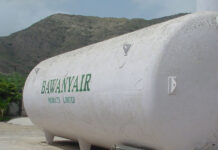— Sources say energy ministry officials were ‘convinced’ to enhance the use of furnace oil instead of LNG in power sector
ISLAMABAD: The national exchequer was losing billions of rupees every month owing to excessive use of furnace oil instead of LNG in the power sector.
Experts believe the decline in the use of LNG might have been caused due to Pakistan LNG Limited’s decision to cut down on consignments on the back of lower demand.
The power division sources disclosed that the “furnace oil lobby” had convinced the officials of the energy ministry to enhance the use of furnace oil in power plants, adding that the officials have so far left no stone unturned in pursuing their goal.
Owing to less demand of LNG by power division, PLL has imported less LNG during the last four months against the already committed import of LNG, causing heavy loses to the exchequer, sources said. Giving an example, sources revealed that Rs430 million loss surfaced only in the month of September, while cumulatively, the national exchequer lost about Rs3 billion on this count.
They said three cargoes out of the total demand of LNG were not being purchased for the last four months despite its low price, while six LNG cargoes were being imported on monthly basis from Qatar through Pakistan State Oil (PSO) despite higher price. LNG purchase through Pakistan State Oil (PSO) instead of PLL has so far benefitted Qatar, divulged sources.
“PLL has been importing LNG from the international market at a low price, while PSO purchases it from Qatar at a higher price. Similarly, Oil and Gas Regulatory Authority (OGRA) has set the price of imported LNG for PSO at $12.67 per MMBTU for September 2018, and for PLL at $11.24 per MMBTU,” sources revealed.
Since textile, commercial and fertilizer sectors have stopped the use of LNG, problems were mounting for the fledgling economy with each passing day. For the uninitiated, OGRA had imposed Rs560 million penalty on May 4, 2018, on PLL and other government officials on failure in importing LNG to meet national energy demands.
It is pertinent to mention that former prime minister Shahid Khaqan Abbasi had obtained approval from the Economic Coordination Committee (ECC) of the federal cabinet to pass on Rs560 million worth PLL’s penalty to the poor LNG consumers.
Documented evidence suggests PSO imported six cargos of LNG in September in accordance with the agreement, while PLL failed to import the cargos apparently because of poor policy of the power division. In May, PLL had failed to import four cargos of LNG to the country. However, it paid Rs566 million to PGPC after collecting the said amount from re-gasified liquefied natural gas (RLNG) consumers of Sui Northern Gas Pipeline Limited (SNGPL) and Sui Southern Gas Pipeline Limited (SSGCL). Although OGRA had already exposed the poor policy of energy ministry regarding lack of LNG use in power sector, it approved to pass on the penalty to (RLNG) users.
As per demand, PLL would only import 12 LNG cargoes in the next four months (Sep to Dec 2018) against the already agreed six cargoes per month. As a result, a significant cut will be witnessed in the use of RLNG for power production, with economy suffering massive losses.
The power division’s decision to enhance the use of dirty and expensive furnace oil for electricity generation instead of cheap and clean RLNG will approximately cause more than Rs3 billion in losses to the country. The increase in the use of furnace oil for power generation purposes will cause power tariff hike by Rs3/unit, and due to this unanticipated increase in the per unit price of power, Pakistan might face a whopping loss of around Rs10 billion.
An official document further revealed that the RLNG requirement for Sep-Oct stood at 900 million cubic feet per day (MMCFD), while an 850 MCFD was indicated for Nov-Dec 2018.
It was also learnt that PLL had already informed all stakeholders that additional LNG cargoes can only be arranged if ordered at least 120 days earlier than required. However, the ministry has directed PLL not to order any LNG import until and unless there is a firm demand from SNGPL/power division of the Ministry of Energy.
Natural gas accounts for approximately 40 to 45 per cent of the total primary energy supply mix of the country. Although the demand for natural gas has increased due to growth in the consumer base, indigenous gas reservoirs continued to deplete, resulting in an imbalance between demand and supply. Due to a demand-supply gap of 2 bcfd (constrained) to 4 bcfd (unconstrained), the country has been consuming electricity generated by furnace oil, which is less efficient and more expensive.
The non-utilisation of gas-fired power plants has had a negative impact on industrial units and resulted in almost complete shutdown of the textile and CNG industry. And the shortage of natural gas meant that Pakistan from being an exporter of fertiliser became an importer.























